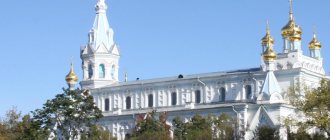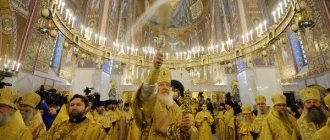Biography
Valentin Meshcherinov was born on September 4, 1966. This happened in Moscow, where the family of the future clergyman, spiritual writer, and missionary lived. His parents were musicians, so after graduating from school there was no question of choosing a profession. Before being called up for military service (1985), he managed to receive a serious musical education.
He graduated from college and then from the conservatory in his hometown. After serving in the armed forces, Valentin returned home and began working in his profession. First, in the Moscow Art Theater Orchestra. Chekhov, then - the Great Hall of the Conservatory.
Hegumen Peter Meshcherinov
The family of the future clergyman was not particularly religious, but was of noble origin. It observed primordially Russian traditions and honored moral values. Valentin Meshcherinov paved the way to God by listening to the beautiful works of Bach, reading books, in particular, the philosophical works of Vladimir Solovyov, F. M. Dostoevsky and many other writers and publicists.
All this led him to church and to accepting holy baptism, and subsequently monasticism. But this did not happen right away. Gradually, the future minister of the church approached his calling:
- 1990 - served at the altar of the Church of the Icon of the Mother of God “The Sign” on Rizhskaya.
- 1991 - attended obedience at the St. Daniel's Monastery. He performed various duties assigned to him by the monastery authorities. He led the choir, helped the dean, was a bell ringer, and a charter leader.
- 1992 - was tonsured and ordained as a hierodeacon.
- 1993 - became a hieromonk.
- 1995 - headed the monastery compound, located in the village of Dolmatovo (Moscow region). He is the rector here to this day.
- 1992-1996 — studied at the correspondence department of MDS.
- 2003 - ordained abbot.
- 2006, September - awarded the order for missionary and spiritual-educational activities.
- 2014-18 — studied in St. Petersburg, at the Theological Academy in the master's department.
All this time, Abbot Peter took an active part in public life, was engaged in missionary, educational and teaching activities.
Father Peter gives lectures on Orthodox music
But his main occupation is obedience to the abbot of the metochion of the St. Danilov Monastery in the village. Dolmatovo, Moscow region. Hegumen Peter and his small brethren care about the spiritual nourishment of the village residents and the fulfillment of all necessary requirements.
They conduct extensive economic activities, thanks to which they meet most of their needs: they maintain a cowshed, vegetable gardens, carry out construction projects, repair temples, and so on. The abbot is well acquainted with the way of life and peculiarities of village life, and is revered by the residents of Dolmatovo and nearby villages.
Why are we forced to look for a pattern of spiritual life?
Orthodox spiritual heritage in the context of the era. What do we mean by this?
It seems to me that one of the most characteristic features of our time is precisely the search for this very spiritual heritage. What is very important is that all these searches are directed to the past. An important thing is immediately revealed here: since there is such an intense search for Orthodox self-identification in the past, it means that current life, the present, does not suit anyone. It is as if empty and requires filling. I want to emphasize this. Firstly, this is precisely one of the essential properties of our era; and secondly, it greatly convicts us as Christians.
“I am with you always, even to the end of the age” (Matt. 28:20), Christ said to His disciples—Christ, who is the same yesterday, today, and forever (Heb. 13:8). A person who has entered the Church of Christ lives by communion with God in Christ here and now, and he has no need to look for anything either in the past or in the future. And since we see such an intense search for models for spiritual life in the past, we must note with regret that in our everyday church present we do not have that very abundant life (John 10:10) that the Lord promised us, and are forced to look for her.
Based on this, the question arises: since we have set exactly this paradigm for searching for solutions to our problems, what should our Church be guided by in its history? Where should we look for a model - namely, a model of church action, not just a copy of the past - so that this search will lead us to life in Christ, and not to this or that imitations?
Public activities
Pyotr Meshcherinov is known for his appearances on radio and television, as well as articles in the press, both ecclesiastical and secular. He often gives lectures at a variety of educational institutions. Participates in seminars, conferences, and helps organize round tables on issues related to church topics.
Interesting! Abbot Peter devotes a lot of time and effort to working with the younger generation. The main goal of his activities in this area is the formation of an Orthodox youth environment where young people will communicate with each other.
Until 2009, Abbot Peter held the position of deputy head of the CDRM (center for the spiritual development of children and youth) at the monastery. Here he supervised the educational department and the school of youth ministry.
Leave the circle of initial external churching
So, answering our question (since we pose it this way) - where can we find a spiritual heritage in order to creatively create our today's life according to its model - it is worth, in my opinion, paying attention to the 18th century, and without closing our eyes to the church-canonical shortcomings of this era and certain methods of unlawful church-state actions (caused by Caesar-papism), to adopt a lot of living and useful things from this period of the existence of our own church tradition. Let us note here the most important things to pay attention to:
1) reliance on Holy Scripture;
2) reducing the role of external ritualism and teaching, which makes it possible to identify the true churchliness of Christ in the everyday life of Christians;
3) creative adoption of certain features of Western spirituality and the Western structure of church life.
An important clarification needs to be made here. When I talk about such adoption, I do not mean at all the modern spiritual and church life of the Western world . Her assessment goes beyond the scope of my report; suffice it to say that if we have not yet come to many things that have been thought out and lived by Western Christians, then most people in the Western world have already moved on, left these things behind; no one, not even the most ardent Westerner, will deny that, as a whole, the “first world” today is post-Christian. In my opinion, it would be worth creatively adopting the experience of early Protestantism; I would put the Great French Revolution as the time limit here.
And here it is necessary to indicate the context of such adoption. It is determined by the main, in my opinion, problem of our church life today, about which I have already spoken and written a lot - the problem of “de-churching” . This is an unfortunate term, but for lack of a better one we will use it. What does this mean?
By “de-churching” I understand the following phenomenon: the currently existing church didactics offers people entering the Church a certain pedagogy of external churching. Over time, it is exhausted - from the Gospel it is obvious that Christian life is a process of constant internal growth (Matthew 13: 31; 33) - and “matured” Christians no longer are nourished by external rituals and the external church subculture they have adopted.
But we do not have a pedagogy for further, so to speak, “post-new” growth in Christianity; it has not been developed (not in ancient monastic books, but in general pastoral methodology).
The norm of churching in our country is becoming the norm of all Christian life, which obviously does not correspond to the true meaning of the Church as an institution, the purpose of which is to lead a person further and more fully into life with Christ and in Christ. Not receiving such a life and year after year walking in the circle of initial external churching, people eventually become convinced of the futility of this and leave this circle.
The tragedy here is that, since we do not have a pedagogy for further growth in Christ, a person, leaving his novice, leaves the Church, and sometimes Christ Himself - because in his novice churchliness he actually did not receive the true experience of life in Christ .
Photo: VK/Simbirsk Metropolis
essays
- Peter (Meshcherinov), Fr.
Conversations about faith and church. - M.: Danilovsky blagovestnik (GUP IPK Ulyan. House of Printing), 2004. - 278 p. - Peter (Meshcherinov), Fr.
About some of our mistakes: [daily missionary work, teaching or studying?, are we afraid of freedom, respecting our children]. - Moscow: Danilov Monastery, “Danilovsky Blagovestnik”, 2007. - 44 p. — (Invitation to dialogue). — ISBN 978-5-89101-222-6.
- Peter (Meshcherinov), Fr.
Church and modernity: questions and answers. - Moscow ; Kyiv: Orthodox Book Center, 2008. - 271 p. — ISBN 978-966-96814-6-1.
- Peter (Meshcherinov), Fr.
The sacrament of repentance: preparation and confession. - M.: Publishing house. Council of the Russian Orthodox Church (Ulyanovsk: Ulyanovsk Press House), 2006. - 44 p. — ISBN 5-94625-145-7.
- Peter (Meshcherinov), Fr.
The sacrament of repentance: preparation and confession. - M.: Publishing house. Council of the Russian Orthodox Church, 2008. - 45 p. — ISBN 5-94625-145-7.
- Peter (Meshcherinov), Fr.
The sacrament of repentance: preparation and confession. - M.: Publishing house. Moscow Patriarchate, 2009. - 42 p. — ISBN 5-94625-145-7.
- Peter (Meshcherinov), Fr., Bozhenov A.V.
Taste the cup of life... About the necessity for a true Christian of constant communion of the Holy Mysteries of Christ.
- Moscow ; Kyiv: Orthodox Book Center, 2008. - ISBN 978-966-96814-4-7. Peter (Meshcherinov), abbot, Bozhenov A.V.
Taste the cup of life... About the necessity for a true Christian of constant communion of the Holy Mysteries of Christ. - M.: QUO VADIS, 2010. - 96 p. — ISBN 458717787877.
About talent and the meaning of life. What is the secret of giftedness? — Danilovsky Blagovestnik, 2009.
Problems of churching. — Quo Vadis, 2010. — 160 p. — ISBN 978-966-96814-3-0.
Life in the Church: the experience of catechetical presentation. - M.: Lepta Book, 2011. - 364 p. — (Fundamentals of the Orthodox worldview, Spiritual conversations: the practice of Orthodox piety). — ISBN 978-5-91173-262-2.
Life in the church: about our faith. - M., 2021. - 346 p. - (Orthodox Library). — 3,000 copies. — ISBN 978-5-699-94926-7.
The beginning and formation of European music: [12+]. - M.: Ripol classic: Pangloss, 2021. - 299 p. — (Lectures PRO. History of music). — ISBN 978-5-386-12297-3.
translations
- Johann Sebastian Bach.
Texts of spiritual works / Transl. Peter (Meshcherinov), father.. - M.: Center book. Rudomino, 2012. - 590 p. — ISBN 978-5-905626-37-1. - Texts of spiritual works: all the creations of the great master / Transl. Peter (Meshcherinov), o.. - 2nd, rev.. - M.: Eksmo, 2014. - 590 p. : ill., portrait p. — ISBN 978-5-699-73475-7.
- Johann Arndt - About true Christianity: [16+] / Trans. Peter (Meshcherinov), o.. - M.: E, 2021. - 1001, [1] p. : ill. — (Treasury of World Christianity).
- Valentin Weigel
Selected works (translation) / Trans. Peter (Meshcherinov), father.. - M.: Rudomino Book Center, 2021. - Gerhard Terstegen - The Path of Truth: [16+] / translation from German by Abbot Peter (Meshcherinov). - M.: Eksmo, 2021. - 488, [1] p. — (Treasury of World Christianity). — 2000 copies. — ISBN 978-5-699-95132-1.
pathological speech
change of world view
- (Healing from “neophyteism” occurs) “through some obligatory internal (and sometimes external) crisis, through an indispensable, painful revaluation of
, let’s say,
external values
” [3].
ideology of a besieged fortress
Loyalty to the ideology of the besieged fortress
However, protection alone will not be able to solve the missionary tasks of the Church and raise its authority[4].
The Holy Fathers do not have thought forms
- Many problems of worship, pastoral care and clergy, youth work, and social service have not been resolved[5].
- The Church did not pass a conciliar condemnation on either Catholics or Protestants; the issue of the boundaries of the Church and other ecclesiological problems were not at all resolved by the Church[6].
pathological speech techniques
approximation
Secularization... in my opinion, is a providential action of God (So! - Ed.) due to the fact that the Church failed to cope with something, with some task, so God (So! - Ed.) handed it over to something external to the church, namely, say, the action of the Enlightenment and secularization[7].
lowercase letter instead of uppercase
The words “God”, “God’s” with a lowercase letter[7].
Biblical allusion
- The Sabbath is for man, not man for the Sabbath.
pathological vocabulary
Absolutize, Absolutizing, Abstraction, Automatic, Actual, Anti-Americanism, Antinomic, Anti-Christian, Apolitical, Apolitical, Atomized, Atomized, Atomized, Atomized, Bureaucratic, Variability, Intercommunication, Byzantine, Byzantine, Byzantine, Influence, Influence, External, Internal life, Reproduction , Eastern churches, Universality, Comprehensive, Whole, Guarantee, Deepest, Humanism, Detailed, Disciplinary-ideological, Disciplinary, Dogmatism, Doctrinal, Spirituality, Spiritual foundations, Eucharistic, Cheerful, Programmed, Frozen, Sophisticated, Impulse, Inertial, Inertia, Intention , Intimate, Extreme, Falsely humble, Personally, Personality, Magic, Maximum, Metaphysical, Mechanical, Obscurantism, Orientation, Nationalistic, Inadequacy, Uninteresting, Uninteresting, Irreducible, Renewal, Ritualism, Obscurantism, Community, Communal, Obligation, One-sided, On behalf of the Church , Churchenize, Paradigmatic, Paradoxical, Paternalism, Repentant, Political, Complete, Habitual, Call, Pseudo-ascetic, Slave, Joy, Joy of Being, Disunity, Flourishing, Realizing, Regulation, Reduction, Reducing, Ritual, Ritualism, Rituality, Ritual, Routine, Routine, Sacred, In itself, Self-worth, Free, Peculiar, Soviet, Solidarity, Co-creativity, Means, Subculture, Subculturality, Schematically, Tragic, Traditional values, Dejected, Dispirited, Dejection, Jingoist, Jingoist, Strengthening, Effort , Formal, Hypocrisy, Temple, Christianity, Purpose, Church, Civilization, Chauvinistic, Ecclesiology, Entropy, Language
keywords
- life
- Church
- Human
- God
- I
- Church
- Christ
- Love
- Lord
- heart
- soul
- spiritual
- Today
- Spirit
- Scripture
- grace
- God's
- thing
- word
- time
Church life of the Danilov Monastery
The abbot of the St. Danilov stauropegic monastery in Moscow is Archimandrite Alexy (Polikarpov).
Archimandrite Alexy (Polikarpov), abbot of the St. Danilov Stavropegic Monastery in Moscow.
According to the rules of the Danilov Monastery, it is a communal monastery: common prayer, work and meals for the monks. Worship services take place daily. The brethren of the monastery are engaged in charity and mercy in medical and children's institutions, in places of detention, and teach in secular and religious higher educational institutions. The monastery operates a Sunday school, catechetical courses for adults, the Danilovsky Blagovestnik publishing house, an excursion service, and various workshops. The monastery has courtyards: in the Ryazan region, in the Moscow region and the Church of St. Nicholas in Izmailovo.
The monastery has 7 churches with chapels. The main and ancient churches are the Trinity Cathedral and the Church of the Holy Fathers of the Seven Ecumenical Councils.
Moscow, Danilovsky Monastery.
Address of the Danilovsky Monastery
115191, Russia, Moscow, st. Danilovsky Val, building 22. Telephone 8 (only on weekdays).
You can get to the Danilovsky Monastery by metro or tram
At the Tulskaya metro station, get off towards the last car from the center. Coming out of the metro, turn back and walk to the tram tracks. Then, turning right, go straight to the monastery.
From the Paveletskaya metro station to the Svyato-Danilov Monastery stop you can take any tram.
From 6 am to 9 pm the monastery is open to visitors.
There is no hotel in the monastery, so there is no way to accommodate pilgrims.
Divine services of the Danilovsky Monastery are held daily
Divine services are held:
- in the Church of the Holy Fathers of the Seven Ecumenical Councils from Monday to Friday;
- in the Church of the Holy Fathers of the Seven Ecumenical Councils and in the Trinity Cathedral on Saturday and Sunday.
By leaving a comment, you accept the user agreement











